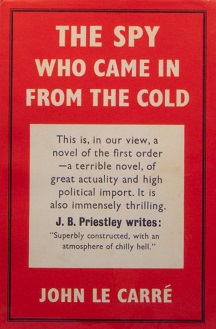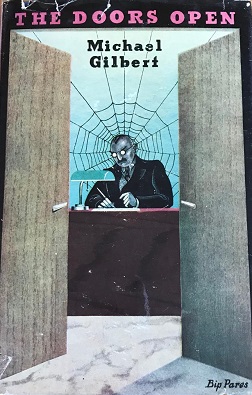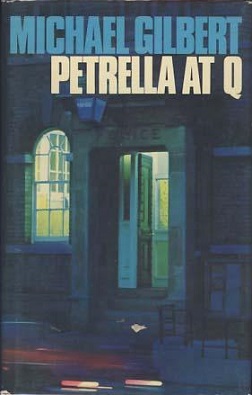Plot
Unusually for Gilbert, only about one third of the book's events take place in his usual locale of London. The book, which is really three related stories around a single theme, is set first in the great British naval base of Portsmouth, then in London, and then for the final third in war-torn France. Luke Pagan, formerly a London policeman and now a young recruit in MO5, the new intelligence service headed by Vernon Kell, is an undercover agent posing as a waiter in a Portsmouth hotel. Elements of the German fleet are in port, and he hopes to gain information about German plans for what most observers believe to be an impending war. His old friend Joe Narrabone, also a former London policeman, has been sent to Portsmouth to assist him. In his guise as a waiter, Luke encounters Erich Krieger, a wily and ruthless German saboteur-intelligence agent now passing as a haughty British major residing in Portsmouth. Pagan and Narrabone unravel the details of Krieger's ingenious espionage, but Krieger escapes before he can be arrested. The second part of the book shifts to London, where Krieger has assumed another identity in the first days of the war and is contributing to the deadly sabotage of British warships. With help from Vernon Kell and Admiral William (Blinker) Hall, soon to be the real-life head of Naval Intelligence, they once again thwart some of Krieger's schemes, rounding up a number of German agents in the process. But, as before, Krieger succeeds in escaping. On the assumption that Krieger is still posing as an English officer, but now in France somewhere near the front lines, Luke and Joe are sent to an important transit camp for British troops near the coastal resort of Le Touquet in northern France to continue their pursuit. Working with both British officers and French villagers and fishermen, Pagan and Narrabone use their usual unorthodox methods to eventually track down Krieger in a series of caverns, where he is leading a sizeable group of British deserters. With lethal help from a vengeful French teenager, they bring their hunt, and the book, to an explosive conclusion.
Spy fiction is a genre of literature involving espionage as an important context or plot device. It emerged in the early twentieth century, inspired by rivalries and intrigues between the major powers, and the establishment of modern intelligence agencies. It was given new impetus by the development of fascism and communism in the lead-up to World War II, continued to develop during the Cold War, and received a fresh impetus from the emergence of rogue states, international criminal organizations, global terrorist networks, maritime piracy and technological sabotage and espionage as potent threats to Western societies. As a genre, spy fiction is thematically related to the novel of adventure, the thriller and the politico-military thriller.
The Double-Cross System or XX System was a World War II counter-espionage and deception operation of the British Security Service (MI5). Nazi agents in Britain – real and false – were captured, turned themselves in or simply announced themselves, and were then used by the British to broadcast mainly disinformation to their Nazi controllers. Its operations were overseen by the Twenty Committee under the chairmanship of John Cecil Masterman; the name of the committee comes from the number 20 in Roman numerals: "XX".

MI5, officially the Security Service, is the United Kingdom's domestic counter-intelligence and security agency and is part of its intelligence machinery alongside the Secret Intelligence Service (MI6), Government Communications Headquarters (GCHQ), and Defence Intelligence (DI). MI5 is directed by the Joint Intelligence Committee (JIC), and the service is bound by the Security Service Act 1989. The service is directed to protect British parliamentary democracy and economic interests and to counter terrorism and espionage within the United Kingdom (UK).

The Spy Who Came in from the Cold is a 1963 Cold War spy novel by the British author John le Carré. It depicts Alec Leamas, a British agent, being sent to East Germany as a faux defector to sow disinformation about a powerful East German intelligence officer. It serves as a sequel to le Carré's previous novels Call for the Dead and A Murder of Quality, which also featured the fictitious British intelligence organization, "The Circus", and its agents George Smiley and Peter Guillam.

Captain Sir Mansfield George Smith-Cumming was a British naval officer who served as the first chief of the Secret Intelligence Service (SIS).
Brigadier-General Sir James Edward Edmonds was an officer of the Royal Engineers in the late-Victorian era British Army who worked in the Intelligence Division, took part in the creation of the forerunner of MI5 and promoted several spy scares, which failed to impress Richard Haldane, the Secretary of State for War (1905–1912). Viscount Esher said that Edmonds was
...a silly witness from the War Office [who saw] rats everywhere - behind every arras.

Major General Sir Vernon George Waldegrave Kell, was a British Army general and the founder and first Director of the British Security Service, otherwise known as MI5. Known as K, he was described in Who's Who as "Commandant, War Department Constabulary".
Mr. Calder and Mr. Behrens are fictional counter-intelligence agents created by the British mystery and thriller writer Michael Gilbert. The characters appear in 24 short stories, most of which first appeared in either the British magazine Argosy or the American Ellery Queen's Mystery Magazine. The stories were collected in two anthologies, Game without Rules (1967) and Mr. Calder & Mr. Behrens (1982). One story, "Double, Double", was later republished in an Ellery Queen paperback. Many involve finding and dealing with British traitors or deeply embedded foreign agents; a few take place in Europe; one particularly grim one is set in World War II, during which Mr. Behrens is the bomb-maker in a failed attempt to assassinate Adolf Hitler. The characters also appeared in 16 BBC radio plays, largely based on the short stories.

General Sir Walter Mervyn St George Kirke, was the Commander in Chief of the British Home Forces at the beginning of the Second World War.

Jeff Abbott is an American suspense novelist. He has degrees in History and English from Rice University. He lives in Austin, Texas. Before writing full-time, he was a creative director at an advertising agency. His early novels were traditional detective fiction, but in recent years he has turned to writing thriller fiction. A theme of his work is the idea of ordinary people caught up in extraordinary danger and fighting to return to their normal lives. His novels are published in several countries and have also been bestsellers in the United Kingdom, Australia, Ireland, Germany, France and Portugal. He is also Creative Director at Springbox, a Prophet company.
Sir Basil Home Thomson, was a British colonial administrator and prison governor, who was head of Metropolitan Police CID during World War I. This gave him a key role in arresting wartime spies, and he was closely involved in the prosecution of Mata Hari, Sir Roger Casement and many Irish and Indian nationalists. His equating of Jews with Bolshevism led to accusations of anti-semitism. Thomson was also a successful novelist.

Sir Robert Nathan (1868–1921) was a British intelligence official notable for his work against the Indian revolutionaries in Bengal, Britain and North America.
The MI5(g), or the MI5 G section, was a branch of MI5 that was formed during World War I to address the wartime espionage operation by the Indian revolutionary movement in Europe. The department arose by renaming the MO5(g) MI5(g) in 1916. The MI5 itself, working under Vernon Kell, had a number of India experts at the beginning of the war. In September 1916, a special section, the MI5(d), section was formed to operate counter-espionage networks throughout the British Empire. Another subsection, the MI5(b), was formed in January 1917 to deal specifically with Indians and "other oriental races".
Gustav Steinhauer was born in Berlin c. 1870. He was an officer of the Imperial German Navy who in 1901 became head of the British section of the German Admiralty's intelligence service, the Nachrichten-Abteilung, ('N'). He had trained at the Pinkerton Detective Agency in Chicago and spoke fluent English with an American accent.

Spying, as well as other intelligence assessment, has existed since ancient history. In the 1980s scholars characterized foreign intelligence as "the missing dimension" of historical scholarship." Since then a largely popular and scholarly literature has emerged. Special attention has been paid to World War II, as well as the Cold War era (1947–1989) that was a favorite for novelists and filmmakers.

They Never Looked Inside is the second novel by the British mystery writer Michael Gilbert. It was published in England by Hodder and Stoughton in 1948 and in the United States by Harper & Brothers in 1949 as He Didn't Mind Danger. It was Gilbert's first publication in the States. It is also the second novel to feature Gilbert's earliest recurring character, Inspector Hazlerigg. Gilbert, who was appointed CBE in 1980, was a founder-member of the British Crime Writers' Association. The Mystery Writers of America named him a Grand Master in 1988 and in 1990 he was presented Bouchercon's Lifetime Achievement Award.

The Doors Open, published by Hodder and Stoughton in England in 1949 and by Walker and Company in the United States in 1962, is the third novel by the British mystery and thriller writer Michael Gilbert. Gilbert, who was appointed CBE in 1980, was a founder-member of the British Crime Writers' Association. The Mystery Writers of America named him a Grand Master in 1988 and in 1990 he was presented Bouchercon's Lifetime Achievement Award. Like his first two books, it features Inspector Hazlerigg, although not in a major role. It is, in fact, a very diffuse book in terms of its characters. Angus McMann, who was the chief protagonist of Gilbert's previous book, They Never Looked Inside, is briefly mentioned on the first page and makes a later appearance as a minor character. Hazlerigg does not appear until page 24 and thereafter only at intervals throughout the book. There are, in actuality, three other protagonists who, along with Hazlerigg, share the role of driving the narrative. One is Noel Anthony Pontarlier Rumbold ("Nap"), a junior solicitor in his father's London firm. Nap had spent four months on dangerous missions with the French maquis in occupied France during the war and is, apparently, still a Lieutenant-Colonel, D.S.O. A few years later he will be a main character in Gilbert's well-received novel Death Has Deep Roots. Patrick (Paddy) Yeatman-Carter, an acquaintance of Nap's, is another lead character, as is his uncle, Alfred Lord Cedarbrook, a man with an astonishing background, much sought after by both the Foreign Office and the War Office during WWII and now, apparently, still affiliated with the Secret Service. As well as being a linguist, explorer, soldier, and diplomat, he also has a law degree. All three of them, to one degree or another, carry out private investigations, sometimes with the backing of Hazlerigg, sometimes not.

Petrella at Q is a collection of 11 short stories plus one longer story divided into four parts about the British policeman Patrick Petrella by the British writer Michael Gilbert published in the United Kingdom by Hodder and Stoughton in 1977 and in the United States by Harper & Row the same year. Gilbert, who was appointed CBE in 1980, was a founder-member of the British Crime Writers' Association. The Mystery Writers of America named him a Grand Master in 1988 and in 1990 he was presented Bouchercon's Lifetime Achievement Award. Many of the stories had previously appeared in such magazines as Reveille in the United Kingdom and Ellery Queen's Mystery Magazine in the United States. In addition to the stories themselves, there is an introductory sketch of Petrella by Gilbert written especially for this book. A second collection of stories, Young Petrella, was published ten years later, in 1987, but consisted exclusively of stories about Petrella's very first years on the force, when he began as a detective constable.

Ring of Terror is a mystery-suspense novel by the British crime writer Michael Gilbert, first published in the United Kingdom in 1995 by Hodder and Stoughton and in the United States by Carroll & Graf. It was Gilbert's 28th novel and the first of three featuring his final set of recurring characters, Luke Pagan and Joe Narrabone. Set in the reign of Edward VII, during the first decade of the 20th century, it was also the first of Gilbert's historical mysteries. Along with its fictional characters and situations, there are references to actual events of the time, such as the Siege of Sidney Street, and Winston Churchill plays a minor role as Home Secretary. Gilbert, who was appointed CBE in 1980, was a founder-member of the British Crime Writers' Association. The Mystery Writers of America named him a Grand Master in 1988 and in 1990 he was presented Bouchercon's Lifetime Achievement Award.
Brigadier-General Sir Eric Edward Boketon Holt-Wilson was a British Army officer who left the army to join the nascent British Security Service (MI5), which developed in time to deal with espionage during World War I. He became the Service's deputy to Sir Vernon Kell, serving through to the beginning of World War II.












